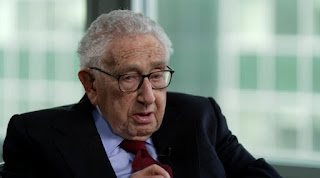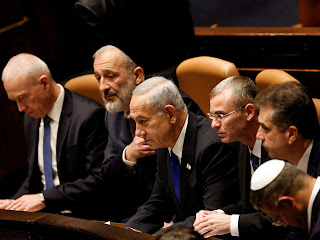Beyond the hypocrisy of table talks: Russian expansionism and the fragile neutrality of Ukraine
In the last days all broadcasted news in tv and
articles in the foreign affairs magazines and newspapers are dominated by the
episode of the amassing of Russian troops on the Ukraine east borders, that
represents a real threat for the maintenance of the peace and stability not
only for this country but also, indirectly, for all the western part of the
continent, EU, and of the world.
Since the spring of 2021, there were simultaneous war
scares in eastern Europe and the western Pacific, due to a Chinese intimidation
campaign against Taiwan and a Russian military buildup on the Ukrainian border.
Russian President Vladimir Putin, in the latest years of his mandate, having
mobilized 175000 troops on Ukraine borders, was threatening to start Europe’s
largest war in decades. Hotbed of conflict, in fact, is not only the east of
Ukraine but all eastern Europe, first target of russian egemonic policy.
Meanwhile, Tehran and Washington looked to be headed for a renewed crisis over
Iran’s nuclear program and its drive for regional primacy. This multiple centers of interests in
Transatalantic zone and Middle East has been a tough challenge for Biden, who
took office hoping to reduce tensions in areas of secondary importance to focus
his foreign policy towards his greatest antagonist: China. USA defense strategy
has internationally come out of balance, with responsibilities highly
surpassing the effective coercive means. Biden is
getting closer with Russia holding periodical virtual meetings with Putin in a bid to establish a “stable and
predictable” relationship, fearing not only it further takes the distance from
Americans polarizing its sphere of influence in its satellite states and buffer
zones but also globally putting on stage a blatant volte-face. He sought to find a path back to the 2015
nuclear deal with Iran, thereby reducing the growing risk of confrontation in
the Middle East; withdraw his troops in
Afghanistan refocusing attention and resources on the Indo-Pacific and contrasted
the Nord Stream 2 gas pipeline linking Russia and western Europe, avoiding Berlin’s
cooperation vis-à-vis with Beijing.
Biden’s
Pentagon likewise spent 2021 focusing on how to deter or defeat Chinese
aggression, “prioritizing China and its military modernization” as its pacing
challenge.
Most problematic of all, U.S.
relations with Iran and Russia has worsened, instead of ameliorating.
In fact, as it was not enough, Putin
has authorized significant cyberattacks against critical infrastructure in the
US. He threatened war against Ukraine in the spring and has now mobilized
forces for what U.S. officials fear could be a major invasion and prolonged
occupation of that country. It would be the third invasion in eight years. To
preserve the peace, Moscow has demanded an acknowledged Russian sphere of
influence and the rollback of NATO’s military presence in eastern Europe. The
US could find itself facing grave security crises in Europe and the Middle East
in addition to persistent tensions in the Pacific and these possibilities hint
at a deeper problem in U.S. statecraft: his strategic overstretch. Already
under Obama’s presidency, it was an open question whether the US could
defeat China if Beijing assaulted Taiwan, or Russia if Moscow invaded the
Baltic region. The most upsetting danger is that the US could have to fight
wars against China and Russia at the same time, exposing to crisis the one-war
military defence strategy. The geopolitical costs of true retrenchment and the
financial costs of rearmament seem to surpass and take over confusion.
Putin has issued a stark ultimatum,
asking for the US make “reliable and firm legal guarantees” that NATO will not
expand eastward or else Russia will invade Ukraine to preserve its
corridor to Crimea and a buffer zone in Donbas. Promises that could not be done
by Americans and that on the contrary has been the only logic counterattack to
his move. As a matter of facts, all the world is observing a standstill point in
this “high-stakes gamble” but seems unlikely that Russia could really take such
a decision, given the determination demonstrated by the secretary of State
Anthony Blinken, in order to demonstrate and to act to be once again the giant
that is never more from more about a century by now and finally ended with the
dissolution of URSS in the ‘90s. It’s only a fact of old memories.
Putin’s keep on menacing that, cementing the
alliance’s status quo, a deadly European war and a devastating conflict could
come could be avoided, really conscious not be in the position to bear such a
responsibility.
History
shows that pledges of neutrality by Ukraine or any other country in the region
do nothing to abate Putin’s appetite; rather, they feed it. Cannot be ignored
Putin aggressive intentions, not only in a large-scale invasion of Ukraine now
on the table, but also for his ambition to rearrange Europe’s security
architecture to the detriment of the West. Evidently, he’s raving and he’s
animated by a spirit of self-destruction with an ardent will of immolating
itself in a suicide adventure! After a long time in which the West has listened
Putin pretentions it’s come the moment to react with strength and clear voice,
and taking stock of the situation.
It is
obvious why Russia demands that Ukraine give up its ambitions for membership in
the EU and NATO, but it is far less clear why anyone in the West should echo
these ill-conceived suggestions. The people of Ukraine made a choice in 2013,
after Ukrainian President Yanukovych, acting at Putin’s behest, sought to
contravene public opinion and integrate the country with Russia instead of the
EU. Consequently, Ukrainians took to the streets in the so-called Euromaidan
protests that Yanukovych tried to brutally suppress, but he underestimated the
will of Ukrainians, who responded with fury and ousted him. Ukrainians have no
interest in cozying up to Russia and will never give up on integrating with the
West. Putin, however, seemed not to have learned that lesson. In response to
Ukraine’s orientation in 2014, Russia invaded Ukraine, occupied Crimea, and
launched a deadly war in the Donbas in a blietzkrieg, taking the lion’s share
with the white flies in an initiative that had doubtful consequences.
Putin greatly underestimated Ukrainian resolve
and faced a massive response by a population poorly equipped but highly
motivated that reduced Putin’s grand designs
to a years-long stalemate on a tiny fraction of land near the Ukrainian
border. The West—the US, the EU, and NATO—did too little, too late in imposing
in July 2014 serious economic sanctions, isolating Russia and adjusting its
policies. But its indecisiveness invited more aggressive actions from Russia,
such as cyberattacks, election
meddling, and targeted assassinations
of opponents abroad.
In the
years after Russia’s intervention, Ukrainians doubled down on their choice to
align themselves with the West, enshrining in their constitution in 2018 the
goals of EU and NATO membership.
Thus at the
moment, Ukrainian neutrality is key to resolving the crisis, as testified in the events of 2014 with its
straight neutral and even more four years earlier, putting an end to its
ambitions for NATO membership passing a law stating that it was a nonaligned
country that had no intention of joining any military alliance, backing instead
since Euromaidan protests in 2013 an economic and political integration with
the EU. If neutrality failed to stop
Putin from launching a war in
2014, it is hard to see why it would stop him now.
Another
ill-advised idea proposed by some experts is to pressure Ukraine into one-sided
concessions, granting compromises that will supposedly make Putin more pacific
but history teaches Ukraine that Moscow is never able to play the role of the
mediator as demonstrated in Donetsk and Luhansk, the two Russian-occupied
regions in the east of Ukraine and in Moldova’s Transnistria neutral region
still occupied by Russian forces alike.
The fact
that Putin is searching for a new ideological justification concerning Ukraine
suggests that he really is on the verge of something big: an attempt to
fundamentally rewrite the post–Cold War security order in Europe. Having
created a crisis, he hopes to invite U.S. President Joe Biden to the
negotiating table to solve it. There, he fantasizes, the two leaders will draw
new lines across Europe, partitioning the continent into new spheres
of influence. Russia is a master of
selling lies, and keep on making poor figures on the international stage with
its illegitimate and ridiculous demands for guarantees and one-sided
concessions. But NATO ignore it and even doesn’t give the satisfaction of
rejecting its ultimatums. They simply ignore them as much as they can and,
meanwhile, the US and its European allies strengthen their efforts to deter
Russia. The only effective way forward is the deterrence plan that Ukraine and
its partners are currently crafting in order to send out a clear message to Moscow:
Ukraine, staunchly propending to the West and aspiring to be a future member of
the EU and NATO that are declaring that its sovereignty and territorial
integrity are nonnegotiable by laws, is being defended by their prompt reaction
according which in the worst-case scenario of an invasion, the West will enact
severe sanctions, and by the provision of weaponry, training and personnel.
Ukraine’s
goal is simple: peace through strength. For now, the US and its European allies
should talk to Putin to win time while strengthening Ukraine. It’s
hard to think that, given Nato proximity, 44 million Ukrainians would not be
sensitive to the temptation to become part of it.
Thus, the noise of Russia's
"drumbeat of war" on Ukraine is a
pressing warning siren, getting Iran back into the agreement that would keep it
from building a nuclear weapon. Iran's nuclear escalation is eliminating, in
fact, the substance of the JCPOA reached in Vienna on 14 July 2015, between Iran and the P5+1 (the five permanent members of the UNSC—China, France, Russia, UK, US—plus
Germany) together with the EU. After the Trump administration twice certified Iran's compliance in 2017, in
May 2018 the United States withdrew from JCPOA as Trump pledged he would
negotiate a better deal. Trump left office without fulfilling that pledge and
analysts determined Iran had moved closer to developing a nuclear weapon since
the American withdrawal even if the Grand Ayatollah Ali Khamenei ensures that an atomic
bomb is "haram" or forbidden in Islam.
Since the breakup of the Soviet
Union, Moscow no longer shares a land border with Iran, but the last thing
Russia wants is another nuclear war and, bringing China into the equation, this
quickly becomes a three-dimensional chess. While concerned about a broader
conflict in the Middle East that could disrupt some of its energy supplies,
China shares few of Russia's fears of a nuclear-armed Iran.
Back to Ukraine border crisis, the
Secretary of State Blinken is supporting this nation and intensifying the
meetings with Zelensky, swearing sanctions against Russian hegemonic ambitions
to make an invasion in this satellite country to get a breakthrough to the sea
waters by an expansion to Crimea and taming Donbass turmoil.
Ukraine is in a shrill division
between the wish to belong to EU and Nato
and the will not to enter in conflict with the atavic allied Russia, in
which area of influence it belongs, that regardless this brotherhood tie is
keen to protect its geopolitical standpoint in the East and protect its
economic profits deriving from the gas pipeline connecting it to Germany and
central Europe. From the international negotiations and formal and informal
talks it’s been looming the idea of a Ukraine integration in Nato without the acquisition
of a formal status. This could be considered a huge point under the profile of
the partition of the sphere of influence but that risks to be inconsistent as a
matter of facts. Both EU and Nato in fact are pursuing a policy of the open
door, that, as clearly stated, doesn’t involve an effective inclusion as
there’s a long road to follow for this country to belong to these organizations
and to build up a strong democracy, not only for economic reasons but also
because of the burden of their traditions. Moscow choice of amassing troupes at
the east border of Ukraine is in fact a peril to the whole east Europe. This
stance dates back to the ancestral competition and aversion with the
capitalistic western society and a Europe that is even overcoming the power of
dollar at detriment of the national claims of popular sovereignty that are
increasing in all their vehemence and rioting strength in the womb of the EU
that, despite a roman catholic common tradition, is essentially kept united by
financial and economic needs more than from a natural will of conjunction in
order to not sink under the weight of the pressures coming from both the
eastern (Russia) and the western side (USA) and to bring a stability and to
represent a balancing zone of mediation,
pursuing the purpose of all international organizations, both with a regional
and universal vocation, to live peacefully in an egualitarian society in which
all the States are put in the condition to sit down together at the same level,
as equals in which are ensured and guaranteed the protections of the enshrined
rights and freedoms, have the same economic power and sustainability, social
perequation and redistribution of resources in the twilight of the ideological
and financial egemonic pretentions all
over the world wherever coming from.
On the other side of the planet,
Blinken, as representative of a Nato Member State, is trying to create a
unified front against Russian cyberattacks and military menaces of aggression,
played out as simple training in a ridiculous stance that hide a nation
unnerved by its military efforts, economic screwing and bringing forward an
ideological belief, the communism, that doesn’t accept to be by now from so
long definitely died, surpassed, and that haven’t never found an acceptable
match in the reality of the working people that hoped to find out a real social
redistribution of resources and social justice.
In conclusion, everyone talk about a world of
equals, but each one pursuit oligarchic interests of predominance and the only
solution prospected since the end of the WWII if we don’t want to re-plung in
another planetarian destructive escalation of conflict is leaving a way, to give room to the liberal and democratic
western organization that, through delicate equilibrium games, infinite rounds
of negotiations, talks, the art of diplomacy are the only actors that keep on
searching to achieve this aim for all, through the struggle of the ideological and religious beliefs, that have incontestably been at the origin of
the deepest injustices, crimes and terror that have always destroyed entire
civil societies trapped in webs of illusions and unrealistic dreams of personal
and social redemption, through the delivering
of humanitarian aids for societies wounded by starvation and diseases,
dragged in lunatic wars that more and more drift apart from the real need of
the individual in a politics that is no more on a human scale, where very
often, as already criticized in the western world by many sides, and even
deeper in the Middle East countries, is alarmingly on the rise a crisis of the democratic representativeness, that
suffers more and more pitiless stabs in a desert of desperation and death in
which “everybody for oneself”, and again through the imposition of sanctions inducing to shifts of often embezzling
positions, changes of attitudes and behaviours of often authoritarian and autocratic
political leaders, avoiding and escaping nuclear lethal threats and an irresponsible
use of the technology, science and research not addressed to make progressist
solutions of twistedness that tight humanity in a grip, that is not put at the
service of the wellbeing and interests of the community but that are used to
enhance the controls more and more closed down and arbitrary espionages in a
society more and more paranoid in which wins the mentality of suspect behind
the smiles of false or pretended collaborations and hands shakes of more and
more ambiguous diplomatic attempts to reach agreements in which is hard to
realize the common welfare, in which every parts remains always circumspect to
be stabbed in the back and duplicity and in which is stressed a generalised
crisis just of the reciprocal trust and of the existence of a real cooperation
between the people other than between governors, beyond the fact to sit
together to the same institutional tables of negotiations, official State
visits, and you may wonder if there is a
real possibility of compromise, if someone really want to yield something in
order to receive something, in a positive do
ut des, in order to achieve important results, if there is a real will to
not entrench oneself in one’s position, if there is a logic of dialogue and an
open mentality or each one is barricaded behind one’s own beliefs, trying to
persuade or even worse impose one’s own perspective over that of the others and
you may wonder what has been the sense of putting together a gathering of so
different States in the womb of the international organizations and who really
want to achieve common aims and a good benefit that seems so difficult to
realize in practice other than with words and beyond the spread out common
hypocrisy to which we all are well acquainted, caused by the fear of military,
political and ideological retaliations and you may wonder if there is any more
a status of security that would have been the main achievement and purpose of
the over-financed and backed Nato that keeps of making military installations
and spent billion dollars in often useless investigations.
Notes:
Ukraine-Russia: Putin and Biden are
caught in a high-stakes gamble - CNN
La crisi Ucraina e il futuro della sicurezza europea
(ispionline.it)





Comments
Post a Comment